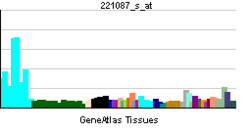APOL3
Apolipoprotein L3 is a protein that in humans is encoded by the APOL3 gene.[2][3]
This gene is a member of the apolipoprotein L gene family. The encoded protein is found in the cytoplasm, where it may affect the movement of lipids or allow the binding of lipids to organelles. In addition, expression of this gene is upregulated by tumor necrosis factor-alpha in endothelial cells lining the normal and atherosclerotic iliac artery and aorta. Six transcript variants encoding three different isoforms have been found for this gene.[3]
References
Further reading
- Horrevoets AJ, Fontijn RD, van Zonneveld AJ, et al. (1999). "Vascular endothelial genes that are responsive to tumor necrosis factor-alpha in vitro are expressed in atherosclerotic lesions, including inhibitor of apoptosis protein-1, stannin, and two novel genes". Blood. 93 (10): 3418–31. PMID 10233894.
- Dunham I, Shimizu N, Roe BA, et al. (1999). "The DNA sequence of human chromosome 22". Nature. 402 (6761): 489–95. doi:10.1038/990031. PMID 10591208.
- Duchateau PN, Pullinger CR, Cho MH, et al. (2001). "Apolipoprotein L gene family: tissue-specific expression, splicing, promoter regions; discovery of a new gene". J. Lipid Res. 42 (4): 620–30. PMID 11290834.
- Monajemi H, Fontijn RD, Pannekoek H, Horrevoets AJ (2002). "The apolipoprotein L gene cluster has emerged recently in evolution and is expressed in human vascular tissue". Genomics. 79 (4): 539–46. doi:10.1006/geno.2002.6729. PMID 11944986.
- Strausberg RL, Feingold EA, Grouse LH, et al. (2003). "Generation and initial analysis of more than 15,000 full-length human and mouse cDNA sequences". Proc. Natl. Acad. Sci. U.S.A. 99 (26): 16899–903. doi:10.1073/pnas.242603899. PMC 139241
 . PMID 12477932.
. PMID 12477932.
- Matsuda A, Suzuki Y, Honda G, et al. (2003). "Large-scale identification and characterization of human genes that activate NF-kappaB and MAPK signaling pathways". Oncogene. 22 (21): 3307–18. doi:10.1038/sj.onc.1206406. PMID 12761501.
- Collins JE, Wright CL, Edwards CA, et al. (2005). "A genome annotation-driven approach to cloning the human ORFeome". Genome Biol. 5 (10): R84. doi:10.1186/gb-2004-5-10-r84. PMC 545604
 . PMID 15461802.
. PMID 15461802.
- Ma J, Dempsey AA, Stamatiou D, et al. (2007). "Identifying leukocyte gene expression patterns associated with plasma lipid levels in human subjects". Atherosclerosis. 191 (1): 63–72. doi:10.1016/j.atherosclerosis.2006.05.032. PMID 16806233.

 . PMID 12477932.
. PMID 12477932. . PMID 15461802.
. PMID 15461802.